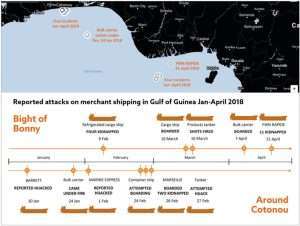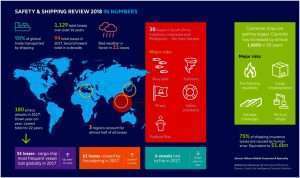Global Shipping Trends
GLOBAL SHIPPING TRENDS & PROBLEMS
In October 2019, the Global Maritime Forum published its annual monitor in which it noted that the global maritime industry—which transports 90 percent of global trade—is ill-prepared for the challenges it faces in the short to medium term. The top threats highlighted in the report include cyberattacks, geopolitical risks, and environmental regulations.
to discuss the industry’s evolving threat landscape.
The Global Maritime Forum’s 2019 report identified cyberattacks and data theft as some of the biggest threats to the industry. Sikich notes that as fully autonomous vessels roll out, anticipated to be in commercial operation by 2025, the industry’s already lagging cyber coverage will make it even more vulnerable, and supply chains could be exposed to long and expensive disruptions.
- In December 2019, hackers infiltratedan American marine transportation facility’s networks, targeting its industrial control systems that control cargo transfers and resulting in an outage that lasted 30 hours. A separate attack shut down a floating oil rig by tilting it, with officials taking a week to identify the cause and fix it, mainly because there were no cyber security professionals aboard.
- In a probe of the online defenses of the world’s 20 largest container carriers, maritime cyber security company CyberKeel found that 16 had serious security gaps. A Brookings studyin 2013 found that, of six US ports, only one had conducted an assessment of how vulnerable it was to a cyberattack.
- The number of known cases of cyberattacks in the industry is low, as attacks often remain invisible to the company or businesses fail to report them for fear of alarming investors, regulators, or insurers.
GNSS Spoofing
The rise of Global Navigation Satellite System spoofing, in which false position coordinates from ground-based transmitters that mimic those sent from satellites are sent to ships or vehicles, poses a growing threat to the maritime shipping industry.
RANE expert Daniil Davydoff from AT-RISK International says that companies should examine the ways in which their operations rely on GNSS technology and develop alternative methods or policies to prevent disruption in the event that GNSS reliability is compromised.
While maritime piracy has decreased worldwide, Sikich notes that hotspots for armed robbery and abductions persist, including Africa’s Gulf of Guinea, which accounted for 82 percent of crew kidnappings globally in the first nine months of 2019.
- Officials say that there has been a growing shift by pirates in the region toward kidnapping crews rather than stealing cargo in an effort to extort ransom from ship owners. Ships spend a long time queuing due to congestion at ports in the Gulf of Guinea, ensuring there are many ships in a relatively small area to target.
- Research from the London School of Economics indicates that the global costof West African piracy to the shipping industry and end consumers is as much as US$3.3 billion.
- Insurance also represents a huge cost. The total cost of additional war risk area premiums incurred by ships transiting the Gulf was US$18.5 million in 2017 alone, and 35 percent of ships transiting the area also carried additional kidnap and ransom insurance totaling US$20.7 million.

Geopolitical risks continue to be a concern for the shipping industry, with companies and governments’ heightening of security measures around the Strait of Hormuz a prime example. Several operators suspended oil shipments through the Strait in the wake of the recent escalation in US-Iran tensions, and Sikich notes that others have diverted cargo shipments to Oman or have had their ships switch off their tracking systems to avoid detection.
- Saudi Arabia’s state-backed oil tanker company Bahri suspendedshipments through the Strait. Saudi Arabia relies heavily on its own tankers and exports most of its oil through Hormuz, and the suspension is expected to at least temporarily reduce its crude exports.
- Many tanker operators have added armed security guards to their vessels in the wake of the attack.
- The US-China trade war has led to slower volume and capacity on the trans-Pacific trade route, keeping the market on edge. Companies operating in China are delaying their plans to restart operations suspended due to the Lunar New Year holiday in the wake of the Wuhan coronavirus outbreak, despite concern that keeping factories closed could disrupt supply chains across a number of industries.
- Complex international sanctions regimes continue to pose financial and reputational risks, and tanker fleets operating in at-risk segments such as trading coal or petroleum or operating in East Asia face additional costs in mitigating the risk of being caught in sanctions evasion ploys.
Sikich notes that container-carrying capacity has increased by almost 1500 percent since 1968, creating a number of new financial and reputational risks for players in the industry.
- With the risein container-carrying capacity on ships, the movement of illegal cargo is becoming more reliable and more difficult to detect. Only about one in ten containers gets checked at ports due to the pressure to deliver vast amounts of cargo on time.
- Still, global seizures of cocaine aboard commercial ships and private vessels more than tripled over the past three years. Agents in Philadelphia hauled in 20 tons of cocaine found aboard the MSC Gayane, the biggest ever cocaine seizure by US border patrol agents. The ship was owned by Mediterranean Shipping Co., the world’s second-biggest liner company, and the seizure took a big boxship out of operation for weeks during the investigation, leaving customer cargoes delayed.
- RANE Expert Timothy Wittig, Head of Intelligence and Analysis at United for Wildlife Taskforces, believes that many firms in the industry fail to have the programs in place to develop a list of bad actors, let alone proactive risk-targeting and analysis. Wittigsays that shipping companies must have strong due diligence and KYC mechanisms in place to address the risks posed by drug, wildlife, and other illicit trades, and suggests enhancing data systems to allow enforcement agencies to screen data and products to identify instances where firms’ supply chains are unwittingly complicit in such trades.

In what some analysts are calling the biggest shake-up for the oil and shipping industry in decades, stricter environmental emissions regulations, including IMO 2020, which requires ships to use fuel with sulfur content of 0.5 percent or less, down from 3.5 percent, or to install devices that strip out the pollutant, will create large short-term costs for industry players.
- Flag states – states in which vessels are registered and hold sole jurisdiction over them – which have signed up under IMO 2020 constitute almost 97 percent of world merchant shipping by tonnage, but Sikichsays that enforcement of the convention rests with individual countries and flag states, meaning compliance will likely be patchy for some routes and regions.
- Failure to comply will result in fines or vessel impoundment, and in some jurisdictions the risk of imprisonment, which could affect requirements such as insurance coverage.

